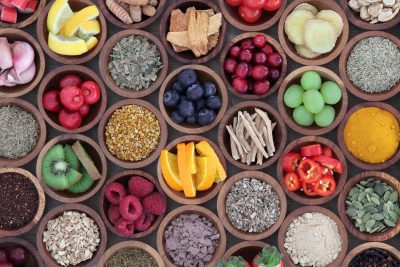The path to attaining optimal health and well-being is paved with plant-based whole foods. These foods act like medicine to our bodies, creating an internal environment through which our overall health is allowed to thrive and chronic diseases are not.
We’re sure you’ve heard these kinds of analogies before: put diesel in a petrol engine and the car won’t run; give candy to your cat and watch it get sick; feed coca-cola to a plant and see it die. Yet often, as intelligent as we are, humans fail to learn from these analogies and, as a result, fail to give their own well-being as much consideration as they would their car, their cat, or even their house plants.
Humans have actually recognized that there is a connection between diet and health for centuries. As far back as 400 B.C., Hippocrates wrote about the relationship of diet to health, but somehow these important lessons of the past seem to have been forgotten and, as a society, we’ve become more comfortable with taking prescription drugs than wholesome food as our medicine.
Are we masochists or did we get confused? Have we failed to see that our health outcomes are determined more by our diets than our genes, or is our addiction to processed, fatty, sugary, and salty foods overwhelming our ability to nurture ourselves through the foods we eat?
Whatever the reason for our poor food choices, the time to acknowledge the role that our diet plays in determining our health is now. Because even when a chronic disease runs in our family, our ultimate fate can still be altered by what we choose to put on our plate.
“What you eat every day is a far more powerful determinant of your health than your DNA or most of the nasty chemicals lurking in your environment.” ― T. Colin Campbell
Reinforcing Your Defense Systems
To most people, health is just the absence of disease, but it should be viewed as much more than that. Health is an active state in our body protected by our own built-in defense systems; defenses so powerful that they can actually reverse diseases, like heart disease, type-2 diabetes, and even cancer. It is the climate in which a flower might grow rather that wilt; an internal ecosystem that upholds life, rather than allowing it to collapse.
Our body’s defense systems are intimately connected to our diets, and while eating the right foods activates their abilities to keep us healthy, eating the wrong foods can destroy them entirely, making us highly susceptible to chronic illnesses.
Unsurprisingly, the animal products and processed, high-fat, high-sugar, and high-sodium foods that a WFPB diet avoid are the foods most detrimental to these defense systems. On the flip side, a wholesome plant-based diet strengthens our immune defenses because fruits, vegetables and grains are packed with antioxidants that possess antiviral capabilities and can stimulate the activities of our immune cells.
Try to think of your body as a castle and your defense systems as a protective moat. Now, if you think of animal products and junk foods as attackers who are trying to drain that moat, you’ll have a good analogy for how the wrong foods can make us more susceptible to attack.
Then you have whole plant foods: the defensive soldiers who dig the moat wider and deeper, making invasion increasingly difficult for the enemy.
DNA and Gene Expression
Contrary to popular belief, having a genetic predisposition to a certain disease does not mean health is out of your hands or that you have no water in you moat. On the contrary! In many cases, diseases actually run in families because eating habits run in families, and the way our genes express themselves is regulated by how we live our lives.
Pioneering biochemist T. Colin Campbell found – through over half a century of scientific analysis – that animal protein in our diets causes cancer-promoting genes to “switch on”, while a WFPB diet can limit and even completely “switch off” the expression of those same genes, thereby controlling disease development.
A 2018 study of ‘Gene Expression Changes in Humans’ also found that the powerful bioactives in plant foods alter gene expression in a positive way; reducing the risk of numerous chronic and inflammatory disorders, including cancer, and cardiovascular and neurological diseases.
While our genes and our DNA are not the same thing and DNA itself cannot be changed; our genes incorporate a DNA defense system that helps us to stay healthy through a response called ‘epigenetic change’. This allows DNA to react to lifestyle exposures, like diet, by “turning on” helpful genes and blocking harmful ones. How we treat our DNA is extremely crucial to our health, and the environment we create in our bodies through our diets is key to how we either mistreat or nurture this essential defense system.
The creation of hazardous environments (through a poor diet, exposure to stress, minimal sleep, and so on) have been linked to epigenetic changes seen in patients with cancer, depression, Alzheimer’s disease, diabetes, IBS, and a host of other serious health problems. So naturally, we want to reduce our exposure to anything that can have detrimental epigenetic effects and embrace the diet and lifestyle that can tap into our body’s capacity for positive epigenetic change. Studies show that the positive epigenetic effect of eating a WFPB diet can be profound.
Telomeres, which protect our DNA and have been found to shorten as we age, are also affected by what we eat, as well as other lifestyle choices. Smoking, eating a standard American diet, and drinking sugary sodas are three key activities that have been found to speed up telomere shortening and, subsequently, our body’s aging process. Conversely, a number plant-based foods actually help to lengthen our telomeres and slow the aging process: foods like mushrooms, berries, spinach, oats, and flax.
Eat to Live
We could go on all day about the amazing abilities of our body’s own defense systems and the incredible power of plants to reinforce those systems, because the studies that link WFPB eating to optimal immune function, reduced chronic disease risk, and better overall health are as numerous as those linking a standard Western diet to a weakened immune function and poor health. Nevertheless, our resource list at the end of this guide will allow you to dig into those studies even further should you wish to.
For this chapter, we’ll simply end by saying that, regardless of how susceptible or invincible we might feel to illness, every bite we take matters and counts towards determining how we’ll feel in later life. You don’t have to have a pre-genetic disposition to a disease to be susceptible to that disease; a lifetime of poor choices will take care of that for you.
The insidious nature of chronic, slow-to-develop diseases means that they often begin to develop in our youth and only tend to emerge as we approach middle age. That’s why, no matter how young we are or how protected we feel by our “good genes”, it’s never too early to ditch bad eating habits and start eating to live.
“Our genes are a predisposition, but our genes are not our fate. If they were, then you’d be a victim, but you’re not—you’re one of the most powerful people on the planet.” ― Dean Ornish, M.D.
Start eating to live by signing up to try vegan with us today. You’ll get access to our free Vegan Starter Kit, Health & Nutrition Guide, recipes, testimonials, and much more when you do!



